Content from the Brookings Doha Center is now archived. In September 2021, after 14 years of impactful partnership, Brookings and the Brookings Doha Center announced that they were ending their affiliation. The Brookings Doha Center is now the Middle East Council on Global Affairs, a separate public policy institution based in Qatar.
While each country has its unique political and economic characteristics, the protests and regime reaction in Egypt from 2011 can offer some lessons for Algerians, says Adel Abdel Ghafar and Anna Jacobs. This piece was originally published in The Monkey Cage at The Washington Post on March 14, 2019. Reprinted with permission.
On Monday, the Algerian presidential election set for April 18 was postponed, with a promise by President Abdelaziz Bouteflika not to run for a fifth term and the resignation of Prime Minister Ahmed Ouyahia. This delay means that Bouteflika’s mandate will be extended indefinitely until a vaguely defined transitional conference takes place. Protests are already planned for the coming days.
In Egypt and Algeria, the army is the most powerful force behind the scenes, and the degree of regime centralization is key to understanding the ability of these regimes to adapt and ride out political crises. As with the period before Hosni Mubarak’s ouster in Egypt, the Algerian deep state is looking for ways out of a precarious situation. It is trying to give the illusion of concessions and a transition that allows those within it to preserve the system and their place in it.
While each country has its unique political and economic characteristics, the protests and regime reaction in Egypt from 2011 can offer some lessons for Algerians. The dominant role of the army and connected political and economic elites means that Algeria’s deep state will not disappear overnight. But the protesters can avoid two key mistakes that were made in Egypt, first, by insisting on actual reforms and refusing to be appeased by the removal of regime personalities and, second, by not leaving the streets until their demands have been met.
Echoes of Egypt
On Feb. 1, 2011, after a historic wave of protests, Mubarak gave a speech that acknowledged the Egyptian protesters’ demands. He appointed a vice president and announced that he would not run for another term. This strategy, perceived by the regime as a massive concession that would absorb the anger of the protesters, did not work. Similar to the recent reactions to regime concessions in Algeria, the momentum of the protests continued.
Demonstrators across the country reacted with fury when Mubarak didn’t resign during his speech on Feb. 10. The army, understanding the volatility of the situation, finally withdrew its support, and he stepped down the next day. The protesters cleared out of Tahrir Square and headed back to their homes on the promise that the army would pave the way for civilian rule.
They were mistaken. Fast forward to 2019, and Egypt’s deep state is stronger than ever. President Abdel Fatah al-Sissi’s regime has proved to be highly adaptable, and he is often described now as “worse than Mubarak.” He is seeking to extend his rule through constitutional amendments that would allow him to stay in power until 2034, dismantling the final gain of the 2011 uprising, a two-term presidential limit.
Le Pouvoir digging in
After Algeria won its independence from French rule in 1962, the National Liberation Front (FLN) became the ultimate symbol of historical and political legitimacy. The role of both the political and armed wings of the FLN gave this organization the power to establish one-party rule through a delicate balance between a presidency, the army, and the FLN as a political party.
Algeria’s regime, known as le Pouvoir (the Power), constitutes a shadowy network of military, economic and political elites who together have ruled from behind for decades. The regime is far from monolithic, and power struggles between the intelligence services, the army and an increasingly dominant presidency became more apparent in recent years. This was especially clear after the 2015 removal of intelligence chief Mohamed Mediène, who was often seen as the real power in the country. After Mediène’s removal, it seemed that the presidency — including Bouteflika himself, his younger brother Said, and a core group of key political, military and business elites — had reset the power balance within a more centralized executive authority.
The regime’s logic was to encourage Bouteflika to run for a fifth term in 2019 to avoid the potential for a power vacuum, real or perceived. However, the regime was not prepared for the massive protests that erupted. The state still believes it can hold the specter of civil war and the potential of a Syria-like scenario over the heads of the people, assuming that if it paints a clear black-and-white picture of stability vs. anarchy, people will always choose the former, especially in light of the Black Decade during the Algerian Civil War.
Lessons learned
Bouteflika’s announcement this week that he will not run for another term borrows a play from Egypt’s playbook. By canceling the next election, the octogenarian Bouteflika has effectively extended his presidential term indefinitely, allowing le Pouvoir to arrange a favorable transition that does not threaten its interests. Bouteflika’s appointing Interior Minister Nourreddine Bedoui, a longtime regime loyalist, as prime minister is exactly what Mubarak did when he appointed Ahmed Shafik as his prime minister during the 2011 protests.
The centralized executive authority, as well as the entrenched role of the army and the FLN, means that the Algerian regime’s ability to adapt and survive this political crisis is great. In other words, an Egypt-like scenario is a high possibility. Concessions will be made and major regime personalities will be sacrificed. But the key question is: Will the Algerian people accept this?
Presence is power, and leaving the streets without concrete outcomes is likely to mean a new Bouteflika will rise and le Pouvoir will stay in place. Already, Algerians are viewing the concessions as a ploy. “Leave means leave” (in Arabic) was trending on twitter in the hours after Bouteflika’s announcement, and protests have been planned for this week to reject the extension of Bouteflika’s mandate. A general strike had been called before Bouteflika’s announcement, as well as multiple campaigns of civil disobedience. The coming weeks will be critical to show whether Algerians will be able to push forward or will end up with an aborted uprising like Egypt’s.
The Brookings Institution is committed to quality, independence, and impact.
We are supported by a diverse array of funders. In line with our values and policies, each Brookings publication represents the sole views of its author(s).
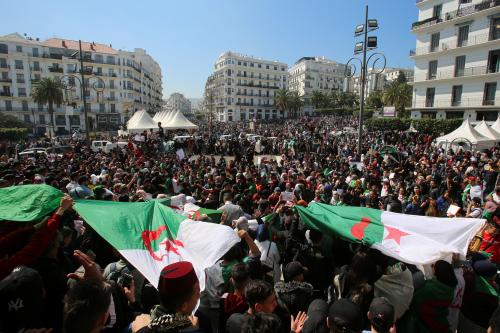
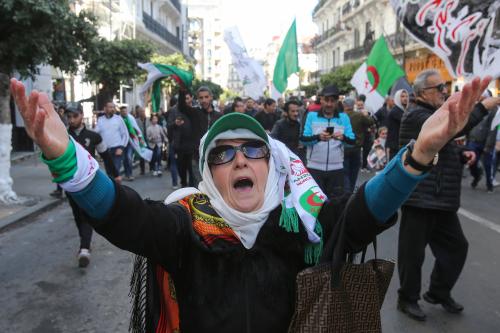
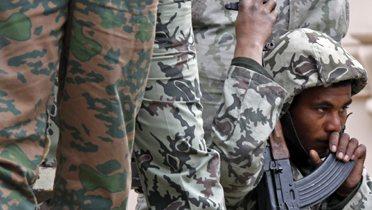
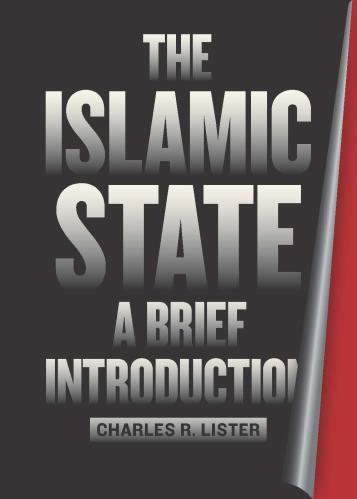
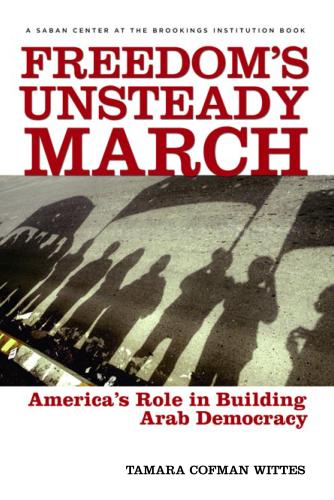






Commentary
Op-edLessons for Algeria from the 2011 Egyptian uprising
March 14, 2019